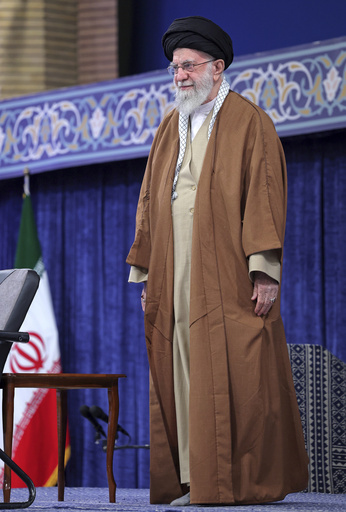
In a recent address, Iran’s supreme leader criticized negotiations with the United States, claiming that such discussions lack intelligence, wisdom, and honor. Ayatollah Ali Khamenei expressed that there should not be negotiations with the current U.S. administration but did not explicitly prohibit dialogue with Washington. His statements overturned months of indications from Tehran that pointed towards a desire to negotiate about its escalating nuclear program in return for easing severe economic sanctions amounting to billions of dollars. Following Khamenei’s remarks, the Iranian rial fell to an unprecedented low of 872,000 rials against the dollar in after-hours trading.
The future trajectory of these diplomatic relations remains uncertain. This is particularly interesting as reformist President Masoud Pezeshkian promised dialogue with Western nations just a day before Khamenei’s comments. The supreme leader’s recent statements to air force officers seemed to contradict previous remarks made in August when he signaled a willingness to engage in talks. Khamenei, who is cautious in his approach to negotiations, often navigates the competing interests between reformist supporters and hard-liners within Iran’s ruling establishment, including the Revolutionary Guard.
Khamenei pointed out that the United States previously withdrew from the nuclear agreement, which had required Iran to significantly limit its uranium enrichment in return for the lifting of sanctions. He stated, “The Americans did not uphold their end of the deal,” emphasizing that the current administration was responsible for dismantling the agreement. He noted, “This is an experience we must learn from,” highlighting the futility of prior negotiations which he believes ultimately yielded no benefits for Iran.
The context for Khamenei’s statement is unclear but coincides with President Trump’s suggestions of wanting to negotiate with Tehran. Just prior to Khamenei’s remarks, Trump signed an executive order aimed at reinstating his “maximum pressure” strategy against Iran. Trump mentioned, “I’m going to sign it, but hopefully we’re not going to have to use it very much,” alluding to ongoing attempts to achieve a deal with Iran without resorting to aggressive tactics.
After suggesting a preference for a peace agreement that would allow Iran to thrive, Trump also made comments on social media indicating that any impending military actions against Iran had been greatly exaggerated. He expressed optimism about reaching a nuclear peace agreement that could lead to celebrations across the Middle East.
In consideration of Khamenei’s history of ambiguous statements with respect to policy, he continues to navigate the internal power struggles that characterize Iran’s political landscape. Recently, President Pezeshkian appeared open to allowing further inspections by the International Atomic Energy Agency, stating that they could inspect Iran’s facilities multiple times, as Iran’s intentions do not include pursuing nuclear weapons.
Iran has consistently stated that its nuclear ambitions are for peaceful purposes. However, the nation now enriches uranium to 60% purity, close to weapons-grade levels, leading to speculation about its future intentions. U.S. intelligence reports indicate that while Iran has not initiated an active weapons program, it is strategically positioning itself to develop such capabilities whenever it chooses.
In addition to diplomatic tensions, Trump proposed that displaced Palestinians from Gaza could be permanently resettled elsewhere, referring to plans for transforming the region into a thriving area dubbed “the Riviera of the Middle East.” Khamenei seemed to reference this proposal, asserting that the U.S. attempts to redraw international boundaries lack legitimacy. He warned that threats from the U.S. would be met with retaliatory actions from Iran if national security were compromised.
Iran’s Foreign Ministry also condemned new U.S. Treasury sanctions targeting companies involved in the trade of sanctioned Iranian oil, labeling these sanctions as “unjustified” and a violation of international norms.

